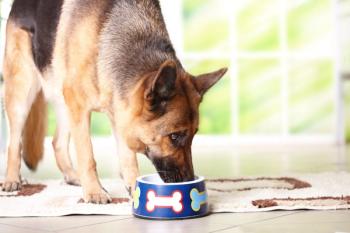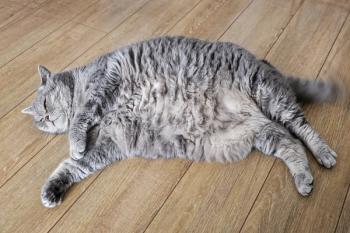
Clinical study shows new IVF Weight Loss/Mobility Plus Formulas help overweight pets attain better body composition
A recent clinical study shows the efficacy of the upgraded IVF weight loss diets in optimizing body composition and body weight inoverweight dogs and cats.
As Dr. Ward discussed, pet obesity is the most common nutritional problem seen in small-animal practice today, and excess weight is also associated with other health conditions, including mobility problems. Both overweight dogs and cats have been found to be more likely to develop joint or mobility concerns. Appropriate nutritional modifi cation can be an e. ective management strategy for these patients, and weight loss alone has been shown to result in substantial improvement in clinical lameness.
The Iams Veterinary Formulas (IVF) weight loss diets have recently been upgraded with increased protein (from chicken) to support muscle mass, added chondroprotectives for healthy joints, and added fructooligosaccharides (FOS) for intestinal health. A recent clinical study reported here shows the e. cacy of the upgraded IVF weight loss diets in optimizing body composition and body weight in overweight dogs and cats.
The study
In this in-home study, overweight and obese dogs and cats (with a body condition score [BCS] of 4 or 5 out of 5) were fed the appropriate IVF Weight Loss/Mobility Plus dry formula for 16 weeks.* The pets were fed amounts intended for phased, gradual weight loss. The 17 dogs and 26 cats were client-owned, otherwise healthy adult pets recruited by a private veterinary clinic. Each animal acted as its own control.
Feeding IVF Weight Loss/Mobility Plus resulted in a significant reduction in body weight (P < 0.05) and a signifi cant reduction in BCS for both dogs and cats. In just four months,
• Nearly one-third of the dogs and one-fi fth of the cats that had been classifi ed as overweight or obese at the beginning of the study had reached an ideal BCS.
• No dogs were classifi ed as obese (BCS of 5), as 8 of them were at the beginning of the study.
Most importantly, feeding IVF Weight Loss/Mobility Plus resulted in signifi cant (P < 0.05) benefi ts for body composition, determined by dual-energy x-ray absorptiometry, in both dogs and cats. By the end of the study, their percent body fat decreased and their percent lean mass increased.
Conclusions
This study provides evidence that feeding IVF Weight Loss/Mobility Plus can help overweight and obese dogs and cats become lighter and leaner. These reduced fat diets with added L-carnitine were e. ective in achieving safe loss of body weight and body fat, while sparing muscle tissue loss. In fact, increased levels of high-quality animal protein should help to support an increase in percent lean mass for both dogs and cats even while they were losing weight. By reducing physical stress on joints, supporting muscle mass, and providing purifi ed chondroprotective nutrients, these diets should help pets achieve healthy mobility with weight loss.
When feeding individual patients for weight loss, veterinarians should consider calculated feeding portions, including recommendations from the diet’s manufacturer, as a starting point. Be aware that you may need to adjust food amounts to reach the patient’s optimal body condition. Scheduling frequent weigh-ins and promptly altering feeding amounts when you notice weight plateaus can ensure a more rapid return to a healthy weight.
*Formerly Weight Loss—Restricted Calorie™
Newsletter
From exam room tips to practice management insights, get trusted veterinary news delivered straight to your inbox—subscribe to dvm360.




